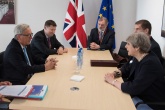Coffey reiterates ambitious recycling targets could lead to ‘perverse actions’
Resources Minister Therese Coffey has once again warned of the potential ‘perverse outcomes’ of over-ambitious recycling targets set to be imposed by the European Union’s Circular Economy Package, suggesting that governments could take detrimental steps to fulfil their legal requirement.
Speaking today at the LARAC (Local Authority Recycling Advisory Committee) Conference yesterday morning (11 October), the minister said that Defra is still in the process of negotiating with the EU about the scale of targets for 2030, with the European Parliament calling for a recycling target of 70 per cent, compared to the European Council’s suggested 60 per cent goal.
At the moment, recycling rates are calculated by weight, and Coffey told the assembled local authority (LA) officers that pressure from this and the existing EU target of 50 per cent recycling by 2020 could lead to clearly ‘ungreen’ practices being carried out, particularly with the bulky garden waste stream.
Coffey said, perhaps jokingly, that this summer, a dry one by British standards, Defra had considered asking residents to hose down their gardens so that more garden waste would be produced, though this decree was never carried out.
This message reiterates to the letter Coffey’s warning to Parliament’s Environmental Audit Committee last September that, without care, prescribing high targets just for ambition’s sake could ‘end up with a perverse outcome’.
Coffey’s address, which opened the two-day conference, seemed to suggest that the UK will indeed be taking on legislation from the package.
In a wide-ranging speech that covered food waste, litter, the Circular Economy Package and Brexit, Coffey also used the same phrase several times: “We shouldn’t let perfect be the enemy of good.”
Waste and resources strategy
As well as reiterating year-old fears, however, Coffey also suggested that a separate waste and resources plan could be on the way next year, as previously intimated by Michael Gove.
The waste industry has been waiting for nearly two years for an idea of the government’s long-term strategy in the shape of Defra’s 25-year Environmental Plan, and Coffey says that it will have to wait even longer, seemingly confirming reports that the document will not be published in 2017.
Since the development of the plan was announced, the minister explained, there have been three Secretaries of State at Defra, each “bringing their own flavour” to the strategy. The plan was ready for publication early this year, prior to Theresa May calling the snap election that eventually saw Gove take up the Environment Secretary post.
Gove, says Coffey, is a “true radical” that is recreating the plan “in his image”, meaning that it will still be longer before the plan is produced. This may not be welcome news to critics like the Green Party’s Co-Leader Caroline Lucas, who called Gove an ‘unfit’ choice for the role in June, given his previous actions to hinder climate change mitigation and criticism of European environmental protections.
However, Gove has previously highlighted that resource management will play a key role in the UK’s environmental future post-Brexit and has pledged to create a renewed strategy on waste and resources, and Coffey made several references to a separate waste and resources strategy that will appear next year.
Irons in the fire
Despite the delay in the publication of the long-term strategy, Coffey did hint at a number of potential policy decisions in the near future, referring to a working group on rigid plastic packaging design led by the Co-operative and a future call for evidence on coffee cups (for which members of the industry have funded a nationwide collection programme this week), much like the consultation currently being carried out for plastic bottles.
Coffey also suggested that Defra was working with the Department for Business, Energy and Industrial Strategy on improving the market for secondary materials, an issue that will also feature in the Defra’s upcoming Clean Growth Strategy for 2050.





